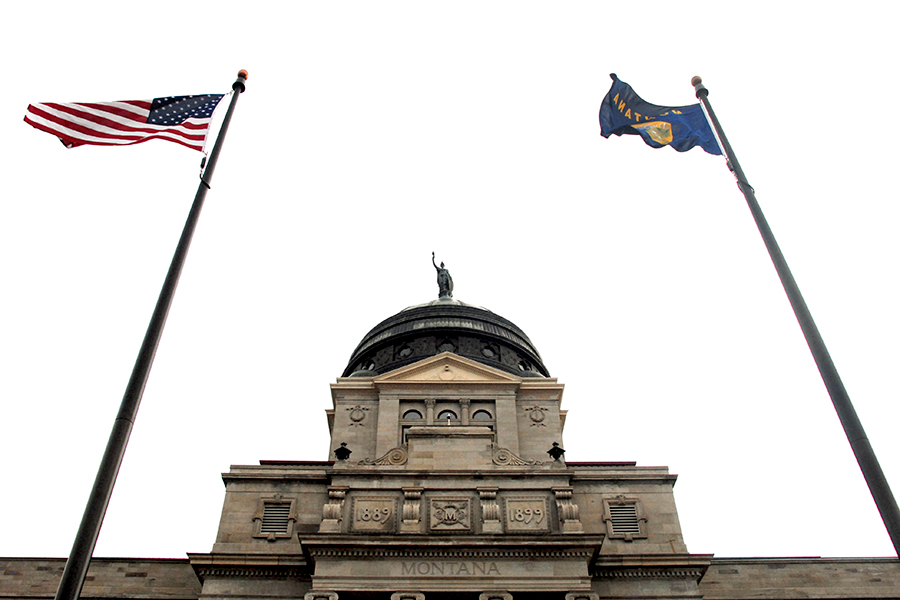Supreme Court Cases May Impact Child Welfare, Water Rights for Montana Tribes
Lawmakers during a meeting of the State-Tribal Relations Interim Committee discussed new legislation and two court rulings that could amend policy on Montana’s Native reservations
By Denali Sagner
Following a legislative session that some Indigenous lawmakers say was defined by currents of anti-Native racism and discrimination, the State-Tribal Relations Interim Committee met in Helena for the first time July 19 to iron out the most pressing issues for Montana’s 12 Native tribes and set an agenda for the interim period. Over the course of the daylong meeting, lawmakers discussed a host of newly passed bills, as well as two U.S. Supreme Court cases that may impact child welfare and water rights for the state’s Native population.
While the Montana Legislature will not convene again until January 2024, numerous interim committees meet between sessions to study policy issues and draft future bills.
Though the committees have historically comprised of an equal number of Democrats and Republicans, a bill this session, introduced by Sen. Keith Regier, R-Kalispell, changed the longstanding formula to reflect the partisan balance of the Legislature. Now, committees mirror the supermajority status held by Republicans in Helena, awarding three interim committee placements to Republicans for every one held by Democrats, a move GOP lawmakers said reflected the will of the people, who sent 102 Republicans to Helena last election cycle.
However, due to an amendment introduced by Rep. Tyson Running Wolf, D-Browning, the State-Tribal Relations Committee has maintained an even party split. Of the 11 Native American state lawmakers in the Montana Legislature, nine are Democrats.
During the July 19 meeting, lawmakers heard presentations from legal staff on two recent U.S. Supreme Court cases — Haaland v. Brackeen, which upheld the Indian Child Welfare Act (ICWA), and Arizona v. Navajo Nation, which ruled that the United States is not obligated to secure water rights for the Navajo Nation. In discussing both cases, legislators and state legal representatives foreshadowed possible consequences for Native communities and tribal lands in Montana.
ICWA is a 1978 federal law that governs jurisdiction over the removal of Native American children from their homes when dealing with cases of adoption, foster care and state child custody proceedings. Federal lawmakers passed ICWA in response to a long history of Native children being separated from their families by welfare and child adoption agencies, isolating them from tribal communities. Under the law, agencies must work to actively involve a child’s family and tribe in custody proceedings and must seek to place children in Native homes before they can be adopted by non-Native families.
The U.S. Supreme Court on June 15 upheld ICWA amid a legal challenge from a white foster family who argued that the law discriminated against non-Native families based on race.
Montana lawmakers during the legislative session passed a statewide version of ICWA, which its sponsor, Rep. Jonathan Windy Boy, D-Box Elder, said came in response to uncertainties about how the Supreme Court would rule on the challenge to ICWA.
Windy Boy’s House Bill 317, titled “Establishing the Montana Indian Child Welfare Act,” or MICWA, codified many of the provisions of ICWA on a statewide basis, giving priority to family members, tribal foster homes and Native families when a Native child enters the foster care system or parental rights are terminated and a placement must be made.
“It’s time to wake up and kind of move forward here, because for too long a lot of our kids have been lost in one system or another, whether it be this system or residential schools,” Windy Boy said during a February House Human Services Committee hearing.

At last Wednesday’s meeting, committee members raised questions about how MICWA would be implemented given the Supreme Court’s decision to uphold federal protections.
“We have 700 children in Yellowstone County that are Indian children that are in placement, so if there’s any glitch, it’s going to muck up the system to a certain extent,” Rep. Sharon Stewart Peregoy, D-Crow Agency, said. “I don’t think it has yet, but with this change, it may.”
Stewart Peregoy said that ironing out the confluence of MICWA and ICWA should be a priority for the committee.
“It’s important to really get all of the players together and look at it, but also to plan ahead and have a meeting,” she said.
Laura Sankey-Keip, staff attorney with the state who presented on the case, said that because MICWA was drafted to preserve the federal protections, the two laws should be able to operate in tandem.
Sankey-Keip also presented on Arizona v. Navajo Nation. The U.S. Supreme Court on June 22 ruled that the federal government is not required to take “affirmative steps” to secure water for the Navajo Nation, the largest enrolled tribe in the United States, as it contends with growing drought risks in the Colorado River system.
Though the state of Montana has 18 negotiated and federally approved compacts in place with its Native reservations that settle reserved water rights, lawmakers discussed the implications of Arizona v. Navajo Nation as battles over water become more contentious amid a drying climate.
“I’m almost thankful that the state of Montana has reached these water compacts before this decision,” Rep. Joe Read, R-Ronan, said. “But if you understand the Salish-Kootenai Water Compact, there is still plenty of argument that is going on over there. Opponents of the existing water compact have not given up, and I don’t think they are going to give up in the long run. It’s going to be a long-term battle, and they’re looking at this as very positive for their effort.”
Committee members referenced historically low water levels at Flathead Lake this summer, which have rattled local businesses, residents of Flathead and Lake counties and the Flathead Indian Reservation, as well as environmental groups, who have warned of the consequences of prolonged drought and lake level disruption.

“We are going to have to be prepared, because the public will probably come very strongly to that interim meeting,” Read said, discussing a future public meeting on water rights in light of the Supreme Court ruling.
“It’s a big issue. If you haven’t read it in the newspapers, it goes right down to the issue of Flathead Lake. It comes down to selling power down to Washington State. It’s a can of worms and we’re going to get hit with it,” he added.
In addition to the Supreme Court rulings, lawmakers during the meeting discussed changes to the Indian Education For All program passed during the most recent legislative session, which strengthens requirements for school districts to educate students on the history and culture of Montana’s Native communities.
The committee also outlined a number of issues to discuss during the remainder of the interim session, including Public Law 280, a 1950s federal law that grants certain states criminal jurisdiction over Native reservations; legislator and state employee training on state-tribal relations following a pattern of ignorance and racially charged comments made during the 2023 session; law enforcement operations; and infrastructure developments, including the distribution of federal funds designed to increase broadband internet access on tribal lands.
More information on legislative interim committees can be found at leg.mt.gov.